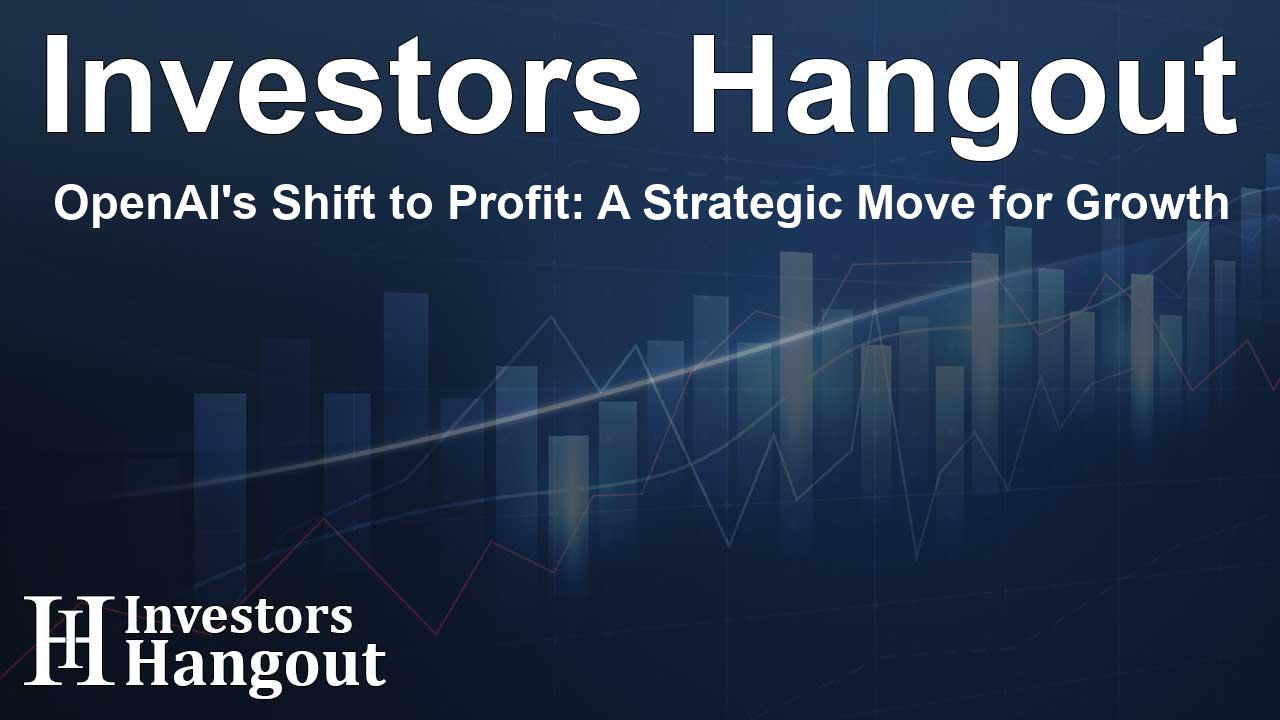OpenAI's Shift to Profit: A Strategic Move for Growth

OpenAI's Potential Transition to a For-Profit Model
OpenAI is taking bold steps towards transforming its nonprofit framework into a for-profit entity. This shift is largely driven by the need to attract substantial investments and foster growth. With Microsoft as a key backer, OpenAI is poised to leverage its new status to maximize profitability and innovation within the rapidly evolving tech landscape.
Experts observe that allowing OpenAI to focus on profitability may significantly benefit Microsoft's investment. As Sarah Kreps from the Tech Policy Institute notes, "Anything that frees up OpenAI to focus on profit is likely to benefit Microsoft's investment in the company." This mutual benefit could shape the future of artificial intelligence as we know it.
Meeting the Challenges of Transitioning
The journey towards becoming a for-profit firm is not without its challenges. OpenAI’s hefty valuation and the intricate web of its for-profit subsidiaries introduce it to legal and public complexities. However, these obstacles do not diminish the prospects seen by investors. The recent announcement of raising approximately $6.6 billion highlighted OpenAI's new valuation of around $157 billion, pending the successful transition to profit.
The implications for Microsoft in this transformation could be significant. A reconfigured business structure may allow for renegotiation of profit-sharing agreements. Observers like Rose Chan Loui of UCLA emphasize that this could lead to increased control for Microsoft and other investors, shifting the balance of power within OpenAI's governance.
Unraveling OpenAI's Historical Foundations
OpenAI began its journey in 2015 as a nonprofit organization, focusing on advancing human capabilities rather than simply generating wealth. Initially designed to be employee-driven, OpenAI created a structure that allowed for fundraising by establishing a for-profit subsidiary in 2019. This was a pivotal moment in the company’s history, facilitating billions of investments from partners like Microsoft while maintaining nonprofit oversight.
As OpenAI navigates this transition, the tension between its nonprofit roots and the demands of a for-profit model becomes increasingly evident. The recent shake-ups within the executive team, including the departure of the chief technology officer, signal a time of turmoil and adaptation. The organization must reconcile its mission with the financial imperatives that accompany its new identity.
The Impacts on Governance and Regulation
Transitioning to a for-profit structure is likely to spark interest from regulators, particularly as both OpenAI and Microsoft come under increased scrutiny regarding market consolidation and competition. The U.S. Federal Trade Commission has already opened investigations, raising concerns about fair competition in the AI sector. As analysts speculate on the potential outcomes, the question of public transparency looms large.
The Future of OpenAI in the For-Profit Arena
As OpenAI moves towards registering as a public benefit corporation, it must operate with a dual mission: generating profits while fulfilling responsibilities to the public good. This hybrid approach, embraced by entities like Elon Musk's xAI and others, offers a framework for balancing profitability with social responsibility.
Investors are keenly watching how OpenAI will navigate its new landscape, as the shift could open doors to further investment opportunities and enhance its market position. As the tech industry continually evolves, such transitions could set precedents for how companies operate amidst complex regulatory environments.
Financial Considerations and Market Value
With OpenAI's anticipated shift, market regulators may scrutinize how assets are valued and whether they receive fair market compensation. Concerns regarding the disposition of its nonprofit assets underscore the need for careful evaluation as new profit-oriented strategies take shape. Experts suggest that the way OpenAI manages this transition will be critical in maintaining stakeholder trust and public confidence.
OpenAI's strategy for moving forward will likely involve enhancing its communication with regulators and the public, ensuring a transparent and ethical approach throughout its changes.
Frequently Asked Questions
Why is OpenAI transitioning to a for-profit model?
OpenAI is considering this transition primarily to attract substantial investments, allowing them to optimize operations and innovation in the competitive tech landscape.
What are the potential benefits for Microsoft in this transition?
The shift could allow Microsoft to renegotiate profit-sharing agreements and increase their influence on OpenAI’s future direction, enhancing the return on their investments.
How has OpenAI's historical structure influenced its current situation?
Originally established as a nonprofit, the complexity of its for-profit subsidiaries and executive governance challenges shapes how they will adapt to become a for-profit entity.
What regulatory challenges may arise from OpenAI's transition?
Regulators may scrutinize the transition, especially regarding market consolidation, fair competition, and the valuation of nonprofit assets during the shift.
How could OpenAI's transition impact the AI industry overall?
This shift might set a precedent for how tech companies balance profitability and social responsibility, influencing industry standards and investment strategies.
About The Author
Contact Owen Jenkins privately here. Or send an email with ATTN: Owen Jenkins as the subject to contact@investorshangout.com.
About Investors Hangout
Investors Hangout is a leading online stock forum for financial discussion and learning, offering a wide range of free tools and resources. It draws in traders of all levels, who exchange market knowledge, investigate trading tactics, and keep an eye on industry developments in real time. Featuring financial articles, stock message boards, quotes, charts, company profiles, and live news updates. Through cooperative learning and a wealth of informational resources, it helps users from novices creating their first portfolios to experts honing their techniques. Join Investors Hangout today: https://investorshangout.com/
The content of this article is based on factual, publicly available information and does not represent legal, financial, or investment advice. Investors Hangout does not offer financial advice, and the author is not a licensed financial advisor. Consult a qualified advisor before making any financial or investment decisions based on this article. This article should not be considered advice to purchase, sell, or hold any securities or other investments. If any of the material provided here is inaccurate, please contact us for corrections.
